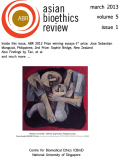
Asian Bioethics Review
Scope & Guideline
Navigating the Complexities of Health Ethics
Introduction
Aims and Scopes
- Bioethics in Diverse Contexts:
The journal focuses on the ethical implications of medical practices, healthcare policies, and biomedical research that are influenced by cultural, religious, and social contexts across Asia. - Governance and Regulation:
It addresses the governance structures and regulatory frameworks surrounding healthcare technologies, including artificial intelligence and reproductive technologies, highlighting variations across different countries. - Clinical Ethics and Consultation:
The journal emphasizes the importance of clinical ethics consultations, exploring their effectiveness and challenges in various healthcare settings, particularly in non-Western countries. - Public Health Ethics:
It examines ethical issues related to public health, including vaccination policies, health disparities, and the ethical implications of health crises such as the COVID-19 pandemic. - Interdisciplinary Approaches:
The journal promotes interdisciplinary dialogue among ethicists, healthcare professionals, and policymakers to foster comprehensive understanding and solutions to bioethical dilemmas.
Trending and Emerging
- Artificial Intelligence in Healthcare:
A significant increase in articles discussing the ethical implications of AI in medical settings indicates a growing concern over data privacy, algorithmic bias, and the role of AI in patient care. - Diversity and Inclusion in Bioethics:
Emerging discussions around diversity, equity, and inclusion, particularly regarding representation in editorial boards and medical practices, highlight the importance of varied perspectives in bioethical discourse. - Global Health and Pandemic Ethics:
The COVID-19 pandemic has catalyzed a surge in publications addressing ethical considerations in public health responses, vaccination policies, and healthcare access during health crises. - Cultural Perspectives on Bioethics:
An increasing number of articles are exploring bioethical issues from distinct cultural and religious viewpoints, reflecting a broader recognition of the need for culturally sensitive bioethical frameworks. - Clinical Ethics in Non-Western Contexts:
There is a growing interest in the role of clinical ethics consultations and their effectiveness in non-Western healthcare systems, emphasizing the need for region-specific ethical guidelines.
Declining or Waning
- Traditional Ethical Debates:
Discussions surrounding long-standing ethical debates, such as those related to organ donation and reproductive rights, have seen decreased frequency, possibly as these topics become more established and less contentious. - Focus on Western Bioethical Frameworks:
There has been a noticeable reduction in papers applying exclusively Western bioethical frameworks to Asian contexts, as the journal increasingly embraces region-specific ethical perspectives. - Historical Perspectives in Bioethics:
Themes centered on historical analyses of bioethical issues have diminished, likely due to a growing emphasis on current and emerging bioethical challenges rather than retrospective evaluations.
Similar Journals
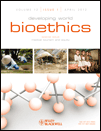
Developing World Bioethics
Advancing ethical discourse in global healthcare.Developing World Bioethics, published by WILEY, is an esteemed journal dedicated to the exploration and advancement of ethical issues in health and healthcare within developing countries. Since its inception in 2001, this journal has become a critical platform for disseminating scholarly research and discourse that address complex bioethical challenges in varied socio-economic contexts. With an impressive Q2 ranking in multiple categories, including Health Policy and Issues, Ethics and Legal Aspects, it stands out as a vital resource among its peers, boasting significant Scopus rankings that highlight its influence and contribution to the fields of health and social sciences. The journal is committed to fostering interdisciplinary dialogue and insight, making it an invaluable asset for researchers, professionals, and students keen on bioethics and health policy. While the journal operates on a subscription basis, it provides broad access to its diverse range of articles, ensuring that cutting-edge bioethical perspectives are available to stakeholders worldwide, with a focus on innovative solutions and best practices in healthcare systems globally.
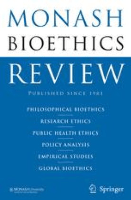
Monash Bioethics Review
Fostering Robust Dialogue on Ethical DilemmasMonash Bioethics Review, published by SPRINGER HEIDELBERG, is a leading journal in the interdisciplinary realm of bioethics, dedicated to exploring critical issues at the intersection of health policy, philosophy, and the social sciences. With an impressive impact factor placing it in Q1 in Philosophy and notable rankings across disciplines, including Q3 in Health Policy and Medicine, it serves as an essential platform for researchers, professionals, and students alike. This journal not only aims to foster robust discourse on ethical dilemmas but also seeks to contribute to policymaking through rigorous analysis and research. Covering articles from its inception in 1994 to the present, Monash Bioethics Review remains committed to addressing contemporary ethical challenges in medicine and society, making it a vital resource for those keen on navigating the complexities of bioethical thought.
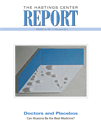
HASTINGS CENTER REPORT
Navigating the complexities of bioethics and policy.The HASTINGS CENTER REPORT, published by WILEY, is a leading journal in the fields of bioethics, health policy, and the philosophical underpinnings of healthcare. Established in 1971, this influential publication provides a critical platform for the discussion of ethical issues in health, medicine, and biotechnology, highlighting the intersection between ethical theory and practical health challenges. The journal achieves remarkable academic stature, achieving Q1 rankings in both Issues, Ethics and Legal Aspects and Philosophy, alongside Q2 standings in Health Policy and Health (social science) categories, reflecting its broad interdisciplinary impact. With its wide readership and rigorous peer-review process, the HASTINGS CENTER REPORT serves as an essential resource for researchers, practitioners, and students dedicated to advancing ethical perspectives in health-related discourse. While the journal operates under traditional access options, its contributions resonate deeply within the academic community, fostering informed dialogue on pressing ethical dilemmas and policy considerations in a rapidly evolving healthcare landscape.

Ethics & Bioethics
Illuminating the intersection of ethics and medical practice.Ethics & Bioethics is a vital interdisciplinary journal published by DE GRUYTER POLAND SP Z O O, focusing on the ethical dimensions of biological and medical practices. Since its transition to an Open Access model in 2016, the journal has become more accessible, promoting the dissemination of high-quality research to a broader audience. Based in Warsaw, Poland, this journal contributes significantly to the discourse on ethical practices in health policy, education, and philosophy, as evidenced by its impressive Scopus rankings, including a Q1 quartile in Philosophy. Covering a wide spectrum of ethical issues and dilemmas faced in contemporary society, Ethics & Bioethics provides a platform for researchers, professionals, and students to engage with cutting-edge scholarship aimed at advancing understanding and fostering dialogue in the ever-evolving landscape of bioethics. With a commitment to rigorous peer review and academic integrity, this journal is pivotal for those seeking to enhance their knowledge and contribute to the field.

BioLaw Journal-Rivista di Biodiritto
Innovating Conversations in Bioethics and PolicyBioLaw Journal-Rivista di Biodiritto, published by UNIV TRENTO, FAC LAW, stands as a vital interdisciplinary platform in the domains of biolaw, biotechnology, and health policy. With an ISSN of 2284-4503 and a burgeoning reputation, this journal encourages critical discussions surrounding the ethical, legal, and social implications of biotechnological advancements from 2014 to 2024. Ranked Q3 in both Biochemistry and Biotechnology, alongside Q2 rankings in Law and Philosophy, it reflects a growing body of scholarship in these experimental fields. Although currently categorized with varying percentile ranks in the Scopus database, it underlines the journal's commitment to nurturing innovative research and interdisciplinary dialogue. The journal promotes open access principles, although the specific access options should be verified for each article. It serves as an indispensable resource for researchers, professionals, and students engaged in the evolving intersection of law and biotechnology, making it a key player in shaping future discourses in bioethics and policy.

International Journal of Chinese & Comparative Philosophy of Medicine
Exploring the Intersection of Tradition and Innovation in MedicineThe International Journal of Chinese & Comparative Philosophy of Medicine, published by GLOBAL SCHOLARLY PUBLICATIONS, is a pivotal scholarly platform dedicated to advancing the discourse around traditional Chinese medicine and comparative philosophies in healthcare. With the ISSN 1386-6354, this journal provides a rich repository of peer-reviewed articles that explore integrative approaches to medicine, addressing both historical context and contemporary applications. Although specific metrics such as impact factor are currently unavailable, it aspires to foster interdisciplinary dialogue among researchers, professionals, and students by encouraging innovative thinking and comparative analysis within the realm of medical philosophy. While currently operating under non-open access guidelines, the journal remains committed to disseminating knowledge that bridges diverse medical practices, making it an invaluable resource for those engaged in the study and application of philosophical medicine.
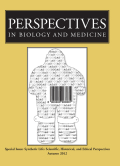
PERSPECTIVES IN BIOLOGY AND MEDICINE
Bridging Disciplines, Shaping FuturesPERSPECTIVES IN BIOLOGY AND MEDICINE, published by the esteemed Johns Hopkins University Press, has been a cornerstone of interdisciplinary dialogue since its inception in 1957. With a rich history spanning over six decades, this journal delves into the multifaceted interactions between biology and medicine, offering insights that are vital for health policy, ethics, and the philosophy of science. Recognized for its impact, it holds a Q2 ranking in the History and Philosophy of Science category and Q3 rankings in several other relevant fields as of 2023. While not an open-access publication, it provides critical analyses and discussions that are indispensable for researchers, professionals, and students alike. With its committed editorial team, PERSPECTIVES IN BIOLOGY AND MEDICINE continues to foster scholarly engagement and is poised to shape the future discourse in the biosciences.

Christian Bioethics
Advancing Dialogue on Faith-Informed BioethicsChristian Bioethics is a pivotal journal published by Oxford University Press, dedicated to the interdisciplinary exploration of bioethical issues from a Christian perspective. Since its inception in 1995, the journal has served as a crucial platform for scholars, practitioners, and students to engage with complex ethical questions at the intersection of medicine, philosophy, and religious studies. With an evolving scope that reflects contemporary debates in bioethics, the journal has achieved notable rankings, including Q2 in Religious Studies and Q3 in Philosophy in 2023, underscoring its significance in these fields. While not open access, Christian Bioethics continues to bridge gaps between faith and science, encouraging rigorous dialogue on how Christian ethics can inform bioethical decision-making and policy. It is essential reading for those looking to deepen their understanding of ethical issues shaped by religious convictions, making it an invaluable resource for researchers and professionals alike.
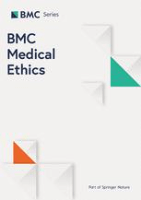
BMC Medical Ethics
Pioneering discussions on nursing ethics and beyond.BMC Medical Ethics is a leading open-access journal dedicated to the critical exploration and dissemination of knowledge surrounding ethical issues in healthcare and medicine. Published by BMC, and headquartered in the United Kingdom, this journal has become a cornerstone in the field since its inception in 2000, with a remarkable focus on health policy, nursing ethics, and the complex legal aspects intertwining with healthcare practices. With an impressive Q1 ranking across multiple categories, including Health Policy and Health (Social Science), it ranks among the top journals globally—particularly notable with its Scopus rankings reflecting a strong 85th percentile in Nursing and an 81st percentile in Social Sciences. As an open-access publication, BMC Medical Ethics ensures that research findings are readily accessible, fostering a collaborative environment for researchers, practitioners, and students alike. The journal's commitment to ethical discourse not only advances academic inquiry but also shapes the practices and policies that govern healthcare delivery; thus, making it an invaluable resource for those engaged in the advancement of medical ethics.

Journal of Bioethical Inquiry
Pioneering Discussions on Health Ethics and PolicyThe Journal of Bioethical Inquiry, published by Springer, is a prominent academic journal in the fields of bioethics, health policy, and social sciences. Established in 2004 and running through 2024, it is recognized for providing a critical platform for the exploration of ethical issues arising in the contexts of healthcare and policy making. With an ISSN of 1176-7529 and an E-ISSN of 1872-4353, this esteemed journal holds a Q2 quartile ranking in both Health Policy and Health (Social Science) categories, indicating its significant impact and contributions to the field. It boasts impressive Scopus rankings, with a standing of #70 out of 371 in Social Sciences _ Health (Social Science) and #68 out of 310 in Medicine _ Health Policy, representing its relevance and authority in these domains. Although it does not currently offer open access options, the Journal of Bioethical Inquiry remains a vital resource for researchers, practitioners, and students eager to engage with the complexities of bioethical challenges and to advance the discourse on health policies.